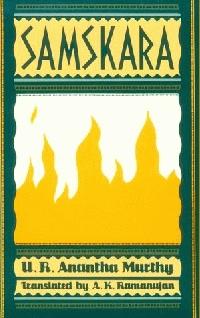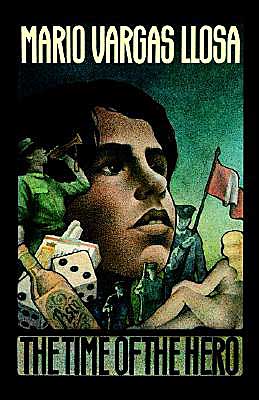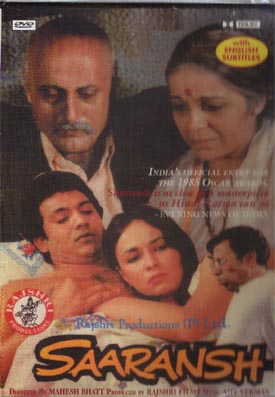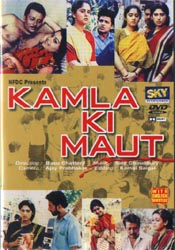Saturday, November 05, 2005
Green Revolution ??

Globalization has opened up the indian market, we have made great strides in certain industries and have been bringing in lot of forex through IT industries. But there is this other side to globalization, which does not get that much media attention as mentioned in my previous post.
We all read about the papers that read '400 farmers commit suicide in andhra pradesh', '300 farmers commit suicide in karnataka,644 in maharashtra, 100 in kerala' but think that it is due to rain and various other reasons, they might be part of the reasons, but slowly and steadily there is a big change happening in the agriculture sector in india.
 The rural anger in Karnataka
The rural anger in KarnatakaRecently there was a huge farmer’s demonstration in bombay where around one-lakh farmers from all over India protested the UPA Government's World Trade Organization (WTO) and anti-farmer policies. The memorandum said
The UPA Government came to power with a mandate from rural India but now it is coming out with anti-farmer and pro-corporation policies ... the Seed Bill 2004, the Food Safety and Standards Bill 2004, the National Agriculture Policy encouraging contract farming, the dismantling of the Public Distribution System, withdrawal of Minimum Support Price for most of the commodities, the reversal of land reforms for MNCs and agro-businesses...more
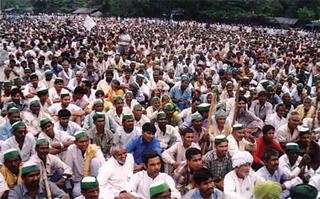
I read about this protest in a tamil magazine(junior vikatan dated 12/10).The article talked about the protests and the farmers problem.Mr.selamuthu the chief of 'The working farmers party' gave a simple example and explained the problems of farmers.I was compeltely taken back by the example.
10 years before cotton was selling 3000 Rs per quintal and diesel was selling 8 Rs.Over the years cotton price has come down to 1600 Rs per quintal and diesel has gone up to 35 Rs.
How could this happen. When inflation is always going up and every commodity that is associated with producing something is going up, how could a agro product have gone down almost half its value in 10 years??.The answer is simply globalization. My research on the root cause of that decline lead me to some shocking information.Here they are.
Since 1995, when India joined the WTO, there has been a surge in imports of agricultural commodities, which are being dumped by developed countries in the international market below their cost of production. This has led to a deep decline in domestic agriculture prices and has deepened the agrarian crisis in rural India. The bulk of agricultural imports constitute mainly edible oils, pulses (chickpeas, pigeon peas, lentils, dry peas etc.). Other major items imported on a regular basis include dairy products, raw cashew nuts, fruits and raw cotton etc.more
How are the foreign countries able to produce those raw materials in such a low cost??.
He pointed at the difference in subsidy to farmers between the developed countries such as the U.S. and other European countries running up to 60 to 75 per cent whereas that of India barely touching 3 per cent.
He said: "How does the Government expect an average Indian farmer, who has less than two hectares of land, to compete with an average European farmer with around 1,000 hectares? more
Apart from the abundant availability of water and other resources an american farmer is more technology oriented and produces more with less labor force. Inspite of all these savings and the better input to output ratio,they get subsidies from there goverment , which enables them to sell there agro products at a less than production cost value.The result is major dumping of these products all over the world.
According to a report, the 2003 US figures show that the agriculture exports from US were sold much below the cost of production:
* Wheat was exported at an average price of 28 percent below cost of production.
* Cotton was exported at an average price of 47 percent below cost of production.
* Rice was exported at an average price of 26 percent below cost of production.
Despite the now ten-year-old World Trade Organization (WTO) agreement to end market distorting practices in agriculture, commodity dumping by U.S. food companies continues and in greater numbers than when the agreement was made. According to an Institute for Agriculture and Trade Policy (IATP) report, all five major U.S. commodities were sold well below the cost of production in 2003.
# Wheat dumping levels increased from an average of 27 percent per year pre-1996 to 37 percent per year post 1996;
# Soybean dumping levels increased from an average of 2 percent per year pre-1996 to 11.8 percent post-1996;
# Maize dumping levels increased for an average of 6.8 percent per year pre-1996 to 19.2 percent post-1996;
# Cotton dumping levels increased from an average of 29.4 percent pre-1996 to an average of 48.4 percent post 1996;
# Rice dumping levels increased from an average of 13.5 percent pre-1996 to an average of 19.2 percent after 1996.more
Moreover, the distortions and imbalances in agriculture trade have also drastically affected the prices, incomes and livelihoods of small farmers in India. Since the inception of the WTO, there is a steep decline in the prices of agricultural commodities internationally. From 1980 to 2000, world prices for 18 major export commodities fell by 25% in real terms. During this period the decline was especially steep for cotton (47%), coffee (64%), rice (61%), cocoa (71%) and sugar (77%). For example international cotton prices came down from 128 cents per pound in 1981 to 38.7 US cents per pound in 2002. Similarly rice prices came down from 565 US$/tonne in 1981 to 160.8 US$/ton in 2002 and sugar prices came down from 18.11 US cents per pound in 1981 to 5.68 US cents per pound in 2002
 WTO and Areca nut farmer suicide
WTO and Areca nut farmer suicideMany feel it is not right for the goverment to give subsidies to the farmer.The state governments giving free power for farmers (which was later revoked my many states because of pressure form IMF) was always a big ussue.But actually farmers in foreign countries get alot more subsidies than what farmers in india get.
How can they ask for electricity bill, increase diesel costs and then not buy our produce at a good price? My family grows sugarcane, wheat and corn but still we are running on losses. Something has to be done.more
And one of the important bills to come is the seed bill.Now the farmers have to buy seeds for there crops from multinational corporations.

The New Seed Bill in the offing, they said, runs counter to the Plant Varieties Protection and Farmers' Right Act (PVPFA), 2001. The Government had given the right to farmers to sell and exchange their seeds through the PVPFA. But those rights are now being taken away through the Seed Bill. This clearly demonstrates that the government is being run by the multinational seed companies...
As the hybrid seeds lose their vigor after one crop, the farmers have to buy the seeds every year from the seed companies. Further, neither the farmers can keep the hybrid seeds or produce it, nor the farmers can exert any control over the prices of hybrid seeds and hence they have to completely depend on the companies for these seeds. The Genetically Modified (GM) seeds are more dangerous, since there is every chance of cross-pollination of GM seeds induced crops with similar indigenous seeds based locally grown crops. As a result the local varieties may in the process get genetically modified and become like terminator plants. There is therefore every possibility that the GM seeds will completely render infertile the local crops/seeds and therefore the food security of the state will be put into danger.more
There are lot of theories going on these. If everybody in the world starts using one type of genetically modified seed then a mistake on that hybrid seed may affect every farmer who is using it all around the world. Read this interesting articles on how the multinational companies are trying to spread there hybrid seeds through food aids here
The focus of the cotton failure has been on the excessive use of pesticides or of spurious pesticides. However, pesticide use intimately linked to hybrid seeds. Pesticides become necessary when crop varieties and cropping patterns are vulnerable to pest attack. Hybrid seeds offer a promise of higher yields, but they also have higher risks of crop failure since they are more prone to pest and disease attack as illustrated by the Andhra Pradesh experience. Monocultures further increase the vulnerability to pest attacks since the same crop of the same variety planted over large areas year after year encourages pest build-ups.more

Instead of addressing their distorted trade practices, the developed world is putting pressure on developing countries to lower the agricultural tariff to allow fair market access to the developed world and their agribusiness corporations. The agricultural tariff in developing countries is already very low and there is very little capacity to undertake further significant cuts without disrupting their rural economies. Tariffs are the only instruments available to these countries for protecting their farmers.
In India in 1990-91, the average applied rate of import tariff was 113%, which was drastically lowered to 35% in 1997-98, which increased to 41% in 2001-02, but again it declines and in 2004-2005 the average applied tariff is 37.5%. Hence the average applied tariff rate in 2004-05 is almost 65% lower than the average applied rate in 1990-91. Some of the key agricultural goods have the minimum applied tariff rate in India, which include pulses 10%, Maize 15%, milk powder 15% etc.
With the withdrawal of quantitative restriction and reduction in tariff, there is a surge of cheap subsidized imports in India. The import of pulses have increased from 490.75 thousands tonnes in 1995-96 to 1992.8 thousands tonnes in 2002-2003. Similarly import of spices increased from 24.28 thousands tonnes in 1995-96 to 147.69 thousands tonnes in 2003-2004. Import of sugar increased from 29 thousands tonnes in 1996-97 to 932.3 thousands tonnes in 2004-05. Edible oil imports increased from 1061.99 thousands tonnes in 1995-96 to 5290.2 thousands tonnes in 2003-04. Cotton import increased from 2.92 thousands tonnes in 1996-97 to 387 thousands tonnes in 2001-2002.
more
In a country where most of the farmers are illiterate how are they going to understand WTO, globalization and foresee the future problems and change accordingly or fight against it??.
Given a conditions where a farmer gets loans for his crops, depends on rains to produce them or pays his electricity bills only to sell them at ever declining cheap price on an increasing cost of producing it, he might not even get a break even on the money spent. When the money lender comes for his money, man handles him OR humiliates him before the public, he might do what other's farmers have done. Commit Suicide.
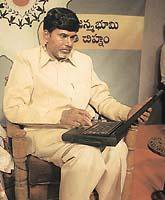
Maybe this is what happened with the 400 farmers who committed suicide in andhra, the 644 in maharashtra. I thought the people were wrong to vote down a chief minister like chandhra babu naidu who did so much for IT and vote in someone who promised free power for farmers. I was thinking that the farmers didn't reason properly and don’t have a sense of who to vote. I now realize that i was just thinking about what concerned me, but there was a bigger population* which cared about a lot of other things than the IT.I really feel bad for the way i used to think about the farmers issue. These articles have made me change my perception of there problems.
Guys if possible link up this post, i would like peoples like me who didn't know anything about what was happening with the indian farmers to read this and know about there conditions.
Links
India's stand at the WTO
Farmers protest in punjab
Farmers dieing because of pesticides
politics and farmer
Listen to the farmers suicide report in NPR
Farmers suicide in kerala
Farmers suicide in maharashtra
Genocide on the farm
*Nearly 25 per cent of the world's farmers are in India. Two-thirds of India's population of 1.1 billion depend on crop and animal husbandry, forestry and agro-forestry, fisheries (inland and marine) and agro-processing for their livelihood.
Comments:
<< Home
brilliant post sen, tne govt is sleeping and not investing in agriculture, rather wants to develop IT which can develop on its own, but agriculture needs the govts help. i wud say ban imports and also revoke the seed bill, allow that no GM seeds be sold in india, the govt?? these jokers dont realise anything and sleep, only when the elections come do they think about the farmer otherwise he is outside their agenda.
sameebathile naan padicha urupadiyana post.
one thing is clear now, the FM Chidambaram and the then FM Manmohan singh... were more worried about FII, Stock market index than the farmer's plight.
one thing is clear now, the FM Chidambaram and the then FM Manmohan singh... were more worried about FII, Stock market index than the farmer's plight.
The death toll is increasing year after year. No wonder why naxalites are having roots everywhere. In Kerala, naxalism was gone after the proper implementation of communism, but now that the party is having a corporate nature, naxalites are getting a big hold in the society. I think this is going to lead to a mass protest and revolution by the farmers.
first time here... came thru shyam's blog...
great post sen... there is always a difference between what we hear in the media and reality... the india shining is very deceptive... only 10% of india (the middle and upper middle class) is shining where as the rest are barely surviving...
with all this, there is another major point.... WATER... all the mineral water going around in the city are being looted from the villages... but a small patch of land and put in a high-power borewell in their land and suck all the water... and this inturn leads to more miseries :-(
great post sen... there is always a difference between what we hear in the media and reality... the india shining is very deceptive... only 10% of india (the middle and upper middle class) is shining where as the rest are barely surviving...
with all this, there is another major point.... WATER... all the mineral water going around in the city are being looted from the villages... but a small patch of land and put in a high-power borewell in their land and suck all the water... and this inturn leads to more miseries :-(
vatsan,
Thanxs.Not sure whether that is the right solution for it.India is thrawting all moves on the tariffs but yes they didn't think though these things when they signed the WTO, they should have made amendments to save the farmers from this crisis.
prabu,
Thanxs.yep looks like that only.
jo,
Is that so?.Dont have any idea of things happening there in kerela.Revolution, i doubt it, put glad atleast lot of farmers are protesting against it.
Shyam,
thanxs machi.thanxs for the link too.
karthick,
thanxs for stopping by.Yes that is right, india shining was deceptive.We dont do proper water management.So much rain is happening in chennai now, in another 6 month there will be water crisis.
Thanxs.Not sure whether that is the right solution for it.India is thrawting all moves on the tariffs but yes they didn't think though these things when they signed the WTO, they should have made amendments to save the farmers from this crisis.
prabu,
Thanxs.yep looks like that only.
jo,
Is that so?.Dont have any idea of things happening there in kerela.Revolution, i doubt it, put glad atleast lot of farmers are protesting against it.
Shyam,
thanxs machi.thanxs for the link too.
karthick,
thanxs for stopping by.Yes that is right, india shining was deceptive.We dont do proper water management.So much rain is happening in chennai now, in another 6 month there will be water crisis.
development should be all around.
IT alone is not development.
Nobody is bothered about farmers plight sad
IT alone is not development.
Nobody is bothered about farmers plight sad
As always, a well researched post. It is really pathetic to realise how we buy bags and bags of grains and food when those who labour to produce them are hardly able to feed themselves.
Sen,
I have no reason to flatter you after the treatment you have meted out to my thalaivar Kamal Sir!
just kidding mate ..:-))
Seriously, your blog is like an oasis in this desert of blogosphere where we are either pro-capitalist, pro-globalization or we're nuts or a fag or both. The issues you have raised [the links you have given] spread out and bring to light a well established pattern. It's so obvious that its difficult to believe that we educated elites don't see the designs of the State, MNCs, World Bank, IMF and co....
"In a country where most of the farmers are illiterate how are they going to understand WTO, globalization and foresee the future problems and change accordingly or fight against it??."
Forget farmers, we middle-class and well to do people (mainly in the blogosphere) are so blindly immersed in the Utopia of corporate and globalized bliss that we are ingorant and intolerant to alternate (and better) viewpoints.
What is free-trade? To a lay person like me, it simply means if A and B are trading, the rules of engagement for both must be the same. Period. It is not merely "commie-crap" as many fanatic nitwits love to dismiss. Its plain simple logic. If Uncle Sam provides subsidies to its farmers and follows protectionist policies so that its own interests or not under threat, and at the same time follows totally different yardsticks while dealing with the third world, how can it be FREE TRADE? In Wayanad district in North Kerala, draught has plagues the region, which was once a haven for agriculturists. Its now infested with cash-crops, which are not only resource draining, but also not for domestic consumption. No prizes for guessing why this is happening. This is just one tiny example.
Honestly, its great to see such posts in blogosphere.
These links might interest you...
http://www.rupe-india.org/
http://www.chomsky.info
http://www.zmag.org/weluser.htm
http://www.counterpunch.org
I have no reason to flatter you after the treatment you have meted out to my thalaivar Kamal Sir!
just kidding mate ..:-))
Seriously, your blog is like an oasis in this desert of blogosphere where we are either pro-capitalist, pro-globalization or we're nuts or a fag or both. The issues you have raised [the links you have given] spread out and bring to light a well established pattern. It's so obvious that its difficult to believe that we educated elites don't see the designs of the State, MNCs, World Bank, IMF and co....
"In a country where most of the farmers are illiterate how are they going to understand WTO, globalization and foresee the future problems and change accordingly or fight against it??."
Forget farmers, we middle-class and well to do people (mainly in the blogosphere) are so blindly immersed in the Utopia of corporate and globalized bliss that we are ingorant and intolerant to alternate (and better) viewpoints.
What is free-trade? To a lay person like me, it simply means if A and B are trading, the rules of engagement for both must be the same. Period. It is not merely "commie-crap" as many fanatic nitwits love to dismiss. Its plain simple logic. If Uncle Sam provides subsidies to its farmers and follows protectionist policies so that its own interests or not under threat, and at the same time follows totally different yardsticks while dealing with the third world, how can it be FREE TRADE? In Wayanad district in North Kerala, draught has plagues the region, which was once a haven for agriculturists. Its now infested with cash-crops, which are not only resource draining, but also not for domestic consumption. No prizes for guessing why this is happening. This is just one tiny example.
Honestly, its great to see such posts in blogosphere.
These links might interest you...
http://www.rupe-india.org/
http://www.chomsky.info
http://www.zmag.org/weluser.htm
http://www.counterpunch.org
Ganesh,Aparna
thanxs
bala
thanxs :). the wayanad example as u mentione dis mone of many that is happening now.The government seems to be totaly oblivious of these changes.
thanxs
bala
thanxs :). the wayanad example as u mentione dis mone of many that is happening now.The government seems to be totaly oblivious of these changes.
Sen,
Hit nail on the head. Unless and until people start thinking about farmers as 'agricultural' assets and not as 'vote banks' - nothing will change !
Shame Shame Shame !
Hit nail on the head. Unless and until people start thinking about farmers as 'agricultural' assets and not as 'vote banks' - nothing will change !
Shame Shame Shame !
"The government seems to be totaly oblivious of these changes."
On the contrary, the Govt knows exactly what's happening. The real drivers of State policy [after you rip off the rhetoric and smoke screens] are the IMF/World Bank backed MNCs and the super-powers.
No wonder that the G8 summit drew some unbelievable and unprecendented protests in Seattle and elsewhere recently!
On the contrary, the Govt knows exactly what's happening. The real drivers of State policy [after you rip off the rhetoric and smoke screens] are the IMF/World Bank backed MNCs and the super-powers.
No wonder that the G8 summit drew some unbelievable and unprecendented protests in Seattle and elsewhere recently!
Sen - here after a long time. Thorough post and brings focus to the problems of a neglected sect.
Quite honestly, I had not given much thought about farmers...until I read your post. Now you have set me thinking...Thanks for that.
Quite honestly, I had not given much thought about farmers...until I read your post. Now you have set me thinking...Thanks for that.
arvind,bala
thanxs
cosmic,
Glad that i have made someone see that fact through this post.How r u?.long time no c
thanxs
cosmic,
Glad that i have made someone see that fact through this post.How r u?.long time no c
i agree with you sen.... you are right.... i am very sad for the very reason that you mentioned for Chandrababu naidu's dismissal.... people in india ( especially farmers ) dont know much of what is to be chosen and not.... i expect this kind of stuff again and again... bye
Post a Comment
<< Home








